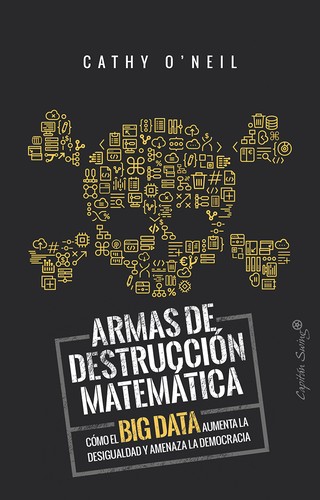testing
5 stars
I did read this book, and it was very good, however this is primarily a test post
Cómo el big data aumenta la desigualdad y amenaza la democracia

Encuadernación rústica con solapas, 280 pages
Spanish language
Published July 10, 2018 by Capitán Swing.
Vivimos en la edad del algoritmo. Las decisiones que afectan a nuestras vidas no están hechas por humanos, sino por modelos matemáticos. En teoría, esto debería conducir a una mayor equidad: todos son juzgados de acuerdo con las mismas reglas, sin sesgo. Pero en realidad, ocurre exactamente lo contrario. Los modelos que se utilizan en la actualidad son opacos, no regulados e incontestables, incluso cuando están equivocados. Esto deriva en un refuerzo de la discriminación: si un estudiante pobre no puede obtener un préstamo porque un modelo de préstamo lo considera demasiado arriesgado (en virtud de su código postal), quedará excluido del tipo de educación que podría sacarlo de la pobreza, produciéndose una espiral viciosa. Los modelos apuntalan a los afortunados y castigan a los oprimidos: bienvenido al lado oscuro del big data.
O’Neil expone los modelos que dan forma a nuestro futuro, como individuos y como sociedad. Estas …
Vivimos en la edad del algoritmo. Las decisiones que afectan a nuestras vidas no están hechas por humanos, sino por modelos matemáticos. En teoría, esto debería conducir a una mayor equidad: todos son juzgados de acuerdo con las mismas reglas, sin sesgo. Pero en realidad, ocurre exactamente lo contrario. Los modelos que se utilizan en la actualidad son opacos, no regulados e incontestables, incluso cuando están equivocados. Esto deriva en un refuerzo de la discriminación: si un estudiante pobre no puede obtener un préstamo porque un modelo de préstamo lo considera demasiado arriesgado (en virtud de su código postal), quedará excluido del tipo de educación que podría sacarlo de la pobreza, produciéndose una espiral viciosa. Los modelos apuntalan a los afortunados y castigan a los oprimidos: bienvenido al lado oscuro del big data.
O’Neil expone los modelos que dan forma a nuestro futuro, como individuos y como sociedad. Estas «armas de destrucción matemática» califican a maestros y estudiantes, ordenan currículos, conceden (o niegan) préstamos, evalúan a los trabajadores, se dirigen a los votantes, fijan la libertad condicional y monitorean nuestra salud.
I did read this book, and it was very good, however this is primarily a test post
This was an exceptional book. It's not heavy into statistics but gives the rationale for what is a WMD (Weapon of Math Destruction) and WMDs maybe a new term but we have been under the exploitation of WMDs well before we think. It's not a new phenomenon but it is one that we should be aware of.
Take a read and learn how about them so that we can all do better to combat them and use math to not only help describe the world but make it a better place to live in.
A very timely, detailed, and expert (yet highly readable) look at the damaging potentials of using algorithms to regulate our lives. This absolutely relevant book is a must-read for anyone involved in data science or simply algorithm users.
Using a clear definition of what constitutes WMDs, (opacity, negative feedback loops, no absence of feedback, they tend to punish the poor, model = black box). O'Neil goes through a wide range of social institutions (health, education, work, politics, criminal justice, to name a few) and examines the damages done by WMDs. My own personal distaste for work wellness stuff felt very validated.
In the end, O'Neil offers suggestions as to what can be done to "tame" WMDs and reduce their damage (including trading some efficiency for fairness), or better, use the same techniques made available thanks to Big Data for socially productive purposes.
One misconception you might have right now is the objective nature of computer algorithms. Cathy O’Neil’s Weapons of Math Destruction first shows you the pinnacle of algorithm objectivity: baseball. Baseball math and algorithms are transparent, measure the event, and are responsive to feedback.
Then, O’Neil pans the camera away to the horror of algorithms that are opaque, rely on proxies, and rarely incorporate feedback: education, finance, mortgages, predictive policing, recidivism, and insurance.
Computer algorithms do not turn their inputs into objective facts. Computer algorithms amplify the biases of the programmer and the dataset. We need to develop a societal understanding of the tools that automate our lives or we’ll forever be manipulated by them.
“Late at night, a police officer finds a drunk man crawling around on his hands and knees under a streetlight. The drunk man tells the officer he’s looking for his wallet. When the officer asks if …
One misconception you might have right now is the objective nature of computer algorithms. Cathy O’Neil’s Weapons of Math Destruction first shows you the pinnacle of algorithm objectivity: baseball. Baseball math and algorithms are transparent, measure the event, and are responsive to feedback.
Then, O’Neil pans the camera away to the horror of algorithms that are opaque, rely on proxies, and rarely incorporate feedback: education, finance, mortgages, predictive policing, recidivism, and insurance.
Computer algorithms do not turn their inputs into objective facts. Computer algorithms amplify the biases of the programmer and the dataset. We need to develop a societal understanding of the tools that automate our lives or we’ll forever be manipulated by them.
“Late at night, a police officer finds a drunk man crawling around on his hands and knees under a streetlight. The drunk man tells the officer he’s looking for his wallet. When the officer asks if he’s sure this is where he dropped the wallet, the man replies that he thinks he more likely dropped it across the street. Then why are you looking over here? the befuddled officer asks. Because the light’s better here, explains the drunk man” (Source: these exact words have 88 Google results).
Weapons of Math Destruction: slpl.bibliocommons.com/item/show/1357767116
